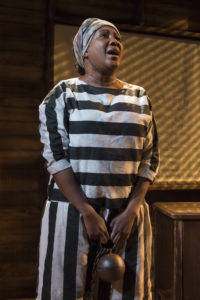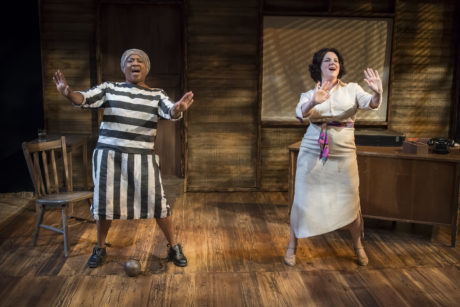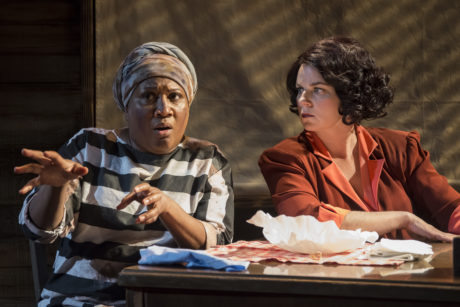Review: ‘Black Pearl Sings’ explores the political and the personal
Politics, whether personal or political often divides us. These differences come to light when two women with out-sized personalities meet in Depression-era Texas in a prison: Susannah Mullally (Teresa Castracane) is a White Musicologist who works for the Library of Congress, she’s a woman “who gets things done!” She has no children.

Alberta “Pearl” Johnson (Roz White) is a Black prisoner for the last 10 years, in for murder; she has a 22 year-old daughter in Houston. Featuring 19 songs, Black Pearl Sings! by playwright Frank Higgins, which runs through May 29th at MetroStage in Alexandria, Virginia, is not only an exploration of the strong personalities of these two women slicing into and reconciling with one another, it is a musical display of fine singing that moves the heart and instructs. With celestial voices, Castracane and White are two incandescent stars that have created an exceptional two-woman musical.
The unforgettable characters of Susannah and Pearl are based on real-life musicologist John Lomax and his subject Huddie “Lead Belly” Ledbetter, who met and worked together in 1933 Texas on an anthology of African American folksongs and ballads.
Each woman has her vision for how they want their lives to go: Susannah is adamant on collecting folk songs by recording them on vinyl for posterity and not letting them escape the ledgers of history: “When a person dies, a library is lost.” In the course of her research, she finds, and in the play interviews Pearl in a drab prison office to mine her knowledge of “Negro” folksongs. Pearl’s vision is not only freedom, but reuniting with her daughter.

After the tentative and clearly nervous Pearl is introduced to Susannah in prison stripes and chains, Susannah slowly draws Pearl out and convinces her to sing (the idea being that she will be recorded); it is here that the fun begins. Pearl’s “Little Sally Walker,” with its “shake it to the East\shake it to the West” refrain and saucy dance, shocks Susannah, who surprisingly tries to copy the sing-and-dance, prompting Pearl to tease: “You ain’t never danced nasty.”
Pearl’s songs were spot on. The spiritual songs “Troubles So Hard” and “Reap What You Sow” stood out and moved the story along; the comical “Skin and Bone,” about a zombie, was short and produced a tidy, physical punchline from Susannah. The song “Blackberries” (a fruit vendor’s call) was saucy and energetic.
The show is equal parts singing and story, and the character’s contrasts continue throughout: Pearl is a Baptist because she, “heard the other churches sing (poorly).” Susannah finds her prayers seemingly don’t reach the ceiling—“popcorn” prayers that go up and come right back down. Each woman plays a bargaining game with one another: Pearl is looking for her daughter and Susannah is trying to get a job at Harvard. One is hindered by racism, the other by sexism.
An appeal to the Texas governor gets Pearl paroled and allows the two women to hit the lecture circuit in New York City. The lecture circuit scenes were well-integrated into the performance; Pearl got the audience (which subbed for an imaginary lecture audience) involved in the refrain for the song “No More Auction Block for Me” (Many thousand more!). Later Pearl sings “Kum Ba Yah,” which evokes her African heritage. Eventually Pearl’s popularity grows to a point where she sings at the Cotton Club (and meets Cab Calloway), where she reports she sang “Don’t you feel my leg” (Then you’ll feel my thigh).
There is a tension throughout the play that boils to the surface more than once: With so many bargains thrown at her, “sing for me and I’ll help you find your daughter” Pearl feels used by Susannah. It becomes clear that Pearl feels like a slave.
But the songs keep the show from getting mired in character-animosity. Susannah’s divinely-voiced Irish-flavored “Six Feet of Earth” is sublime in its simple power and message of the universality of the experiences of Man. Susannah’s songs were numerically less than Pearl’s but no less affecting.
As the story moves forward and songs are sung, the women bicker over everything, from Pearl’s insistence on singing a political union song at a lecture, to the fact that Pearl is called “Black Pearl,” but Susannah is not called “White Susannah.” But through it all, there is mutual trust and respect, maybe even love. Eventually all issues settle down and life appears tranquil, until tragedy strikes and brings the women closer together.

Director Sandra L.Holloway did a masterful job keeping the energy of the two-woman cast high for the duration of the show. Music Director William Hubbard helped Holloway make the songs come alive, and Set Designers Carl Gudenius and Shuxing Fan created a convincing prison office and 30s-era New York City apartment. Sound Designer Gordon Nimmo-Smith made effective use of off-stage voices, and Costume Designer Janine Sunday created effective costumes that ranged from prison stripes to 1930s dresses.
Black Pearl Sings! is a five-star, standing-ovation spectacular which will inspire laughter, cheers, and reflection throughout its run. It is certainly at the apex of five-star worthy shows in the Washington, D.C. area this year.
Running Time: Two hours, with a 15-minute intermission.
Black Pearl Sings! plays through May 29, 2016 at Metro Stage – 1201 North Royal Street, in Alexandria, VA. For tickets, call the box office at (703) 548-9044, or purchase them online.
LINK:
Roz White and Teresa Castracane on Appearing in ‘Black Pearl Sings!’ at MetroStage by Joel Markowitz.
RATING:





